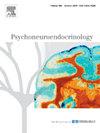鼻内催产素能否增强精神障碍患者的心理治疗效果?系统回顾与荟萃分析。
IF 3.4
2区 医学
Q2 ENDOCRINOLOGY & METABOLISM
引用次数: 0
摘要
近年来,人们对催产素治疗精神疾病(尤其是涉及社交功能障碍的疾病)的兴趣大大增加。迄今为止,大多数研究仅对催产素作为单一疗法进行了评估,结果极不一致。新的研究方向是探索催产素与心理疗法相结合的效果。本综述旨在评估鼻内注射催产素与心理疗法相结合对精神障碍患者的治疗效果。只有随机临床试验设计符合纳入条件。通过对相关数据库的检索,我们找到了截至 2024 年 4 月 30 日发表的 2480 篇文章。其中,13 项试验(518 名参与者)被纳入本综述,4 项被纳入荟萃分析。这些试验评估了一系列不同的心理治疗干预措施、催产素剂量和精神障碍。总体而言,这些试验表明,综合治疗可减少负面心理表征、减轻压力并增强治疗联盟。元分析表明,联合治疗可显著减轻抑郁症状(d=-1.58,95 % CI:-3.15 至-0.01)。然而,催产素治疗对精神症状(d= 0.00,95 % CI:-0.56-0.57)或社会功能(d= 0.21,95 % CI:-0.07-0.49)无明显影响。不足之处包括试验的异质性和样本量有限。研究结果表明,鼻内注射催产素与心理治疗相结合可能是一种有效的治疗方法,可减轻精神障碍患者的抑郁症状,并可改善患者的保持率和治疗联盟。本文章由计算机程序翻译,如有差异,请以英文原文为准。
Could intranasal oxytocin enhance the effects of psychotherapy in individuals with mental disorders? A systematic review and meta-analysis
Interest in the therapeutic potential of oxytocin for the treatment of mental health disorders, especially those involving social dysfunction, has increased considerably in recent years. To date, most studies have only evaluated oxytocin as monotherapy, with highly inconsistent results. A new line of research is exploring the effects of combining oxytocin with psychotherapy. The aim of the present review was to evaluate the therapeutic effects of intranasal oxytocin combined with psychotherapy in individuals with psychiatric disorders. Only randomized clinical trial design was eligible for inclusion. A search of relevant databases yielded 2480 articles published through April 30, 2024. Of these, 13 trials (518 participants) were included in this review and 4 of them in a meta-analysis. The trials evaluated a range of different psychotherapeutic interventions, oxytocin doses, and mental disorders. Overall, the trials suggested that combined treatment reduced negative mental representations, decreased stress, and increased therapeutic alliance. Meta-analysis showed that combined treatment significantly reduced depressive symptoms (d= −1.58, 95 % CI: −3.15 to −0.01). However, the treatment with oxytocin had no significant effects on psychiatric symptoms (d= 0.00, 95 % CI: −0.56–0.57) or social functioning (d = 0.21, 95 % CI: −0.07–0.49). Limitations included the heterogeneity and limited sample sizes of the trials. The findings suggest that the combination of intranasal oxytocin and psychotherapy may be an effective therapeutic approach to reduce depressive symptoms in individuals with mental disorders and may improve retention and therapeutic alliance.
求助全文
通过发布文献求助,成功后即可免费获取论文全文。
去求助
来源期刊

Psychoneuroendocrinology
医学-精神病学
CiteScore
7.40
自引率
8.10%
发文量
268
审稿时长
66 days
期刊介绍:
Psychoneuroendocrinology publishes papers dealing with the interrelated disciplines of psychology, neurobiology, endocrinology, immunology, neurology, and psychiatry, with an emphasis on multidisciplinary studies aiming at integrating these disciplines in terms of either basic research or clinical implications. One of the main goals is to understand how a variety of psychobiological factors interact in the expression of the stress response as it relates to the development and/or maintenance of neuropsychiatric illnesses.
 求助内容:
求助内容: 应助结果提醒方式:
应助结果提醒方式:


